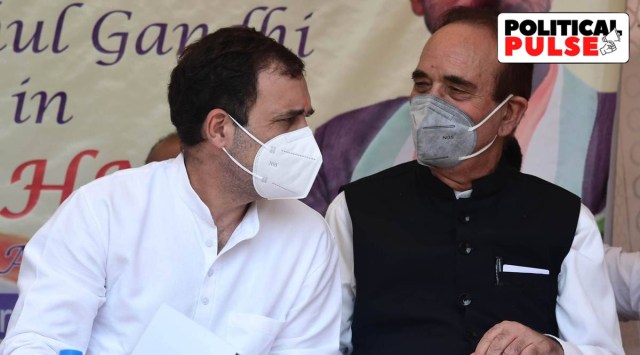ON A DOWNWARD slope in Jammu and Kashmir since 2002, the Congress has gone in for another change at the top to shake things up and end infighting. On Wednesday, the party’s J&K chief Ghulam Ahmad Mir resigned after seven years in the post, in a gesture seen as directed at mollifying the Ghulam Nabi Azad-led faction.
Sources said the PCC chief was told to put in his papers to facilitate the restructuring of the party in the Union Territory. Mir had been appointed in 2015 in place of Saifuddin Soz, then too in the hope of nipping factionalism in the party.

A two-time MLA and former state minister, Mir, 66, belongs to Dooru area in South Kashmir and started his association with the party at a young age, joining first the Youth Congress. He moved to Delhi later and grew very close to the Gandhis, which gave a spurt to his rise in the party. He returned to Kashmir after the 1996 Assembly polls, the first after insurgency began in the erstwhile state and a long period of Governor’s rule.
Story continues below this ad
In 2002, Mir fought his first state election, winning big from Dooru constituency in south Kashmir, dislodging the National Conference from the seat after almost four decades. In the PDP-Congress coalition government that followed, he was appointed Roads and Building Minister.
In 2006, Mir took a severe jolt with his name surfacing in the infamous Srinagar sex abuse scandal, allegedly involving top politicians, bureaucrats, police and security officials. Mir was arrested by the CBI and spent a year in jail. In 2012, a court in Chandigarh – where the trial was moved — acquitted Mir as witnesses failed to turn up in court. While most of the other accused in the case were acquitted as well as witnesses turned hostile, five people including a former BSF DIG were sentenced to 10 years.
By then, the PDP-Congress government had come to an early collapse as the PDP pulled the rug, incidentally when Azad was the Chief Minister as part of a rotational arrangement between the two parties. In the 2008 Assembly elections that followed, Mir retained the Dooru seat, and this time became Tourism Minister in the Omar Abdullah-led National Conference-Congress government that was formed.
In the 2014 Assembly polls though, Mir lost to the PDP’s Farooq Andrabi. The high command then rehabilitated the old-time loyalist as PCC chief.
Story continues below this ad
Almost from the beginning, Mir tread on many toes, suspending former ministers Gulchain Singh Charak, Prem Sagar Aziz and Abdul Gani Vakil for “anti-party activities”. All three were seen as Azad loyalists. The cracks this action caused never healed.
In the 2019 parliamentary elections, Mir stood as a Congress candidate from South Kashmir but lost again, this time to the National Conference’s Hasnain Masoodi.
But the Congress itself has been losing its hold in J&K. In 2002, when it was in government, in coalition with the PDP, it had bagged 20 seats in a House of 87. By 2008, this had come down to 17; by 2014 to 12 (falling below the BJP for the first time as the party rode the Modi wave). The BJP, in contrast, has been rising – from 1 seat in 2002, to 10 in 2008, and 25 in 2014.
Elections have not been held in J&K since, with the BJP pulling out of the coalition government with the PDP in 2018, and the state’s status changed to UT in 2019. With the planned delimitation in J&K – without Ladakh – over, elections can happen any time now.
Story continues below this ad
The Congress is expected to further feel the pinch due to the BJP’s rise, especially in Jammu where its vote base has essentially transferred to the rival party. The BJP won all its 25 seats in 2014 in Jammu, and secured 26.2 per cent of the votes, against the Congress’s share of 18.36 per cent.
In the last election held in J&K, the 2019 Lok Sabha polls, the Congress had failed to win a single seat from J&K. In fact, the party’s Udhampur candidate, Vikramaditya, the scion of the erstwhile J&K royal Dogra family, had lost to Jitendra Singh by a record margin of over 3.5 lakh votes. The Congress vote share in the elections was 28.6 per cent, against the BJP’s 46.6 per cent.
After 2019, calls seeking Mir’s resignation were growing.
Many party leaders see Azad’s “sidelining” in the state unit as one cause for the Congress’s miserable performance. A leader seen as close to the party veteran said: “Azad sahib is the only leader who can gain some seats for the party, and Mir sahib tried to sideline him to secure his own chair. This was going to boomerang both for the Congress and Mir sahib.”
With Azad part of the rebel G-23 group in the Congress, it is unclear how things go from here in the state unit.
Story continues below this ad
Those close to Mir say it is unfair to point fingers just at him. “You can’t blame Mir sahib for everything that has been happening in the Congress,” said a leader. “The decline started much before he took over as PCC president, with the party already down to 12 (Assembly) seats by then. The test of his leadership could have been the elections to come (the first Assembly polls under him), but he was asked to step down before they could be held.”
































